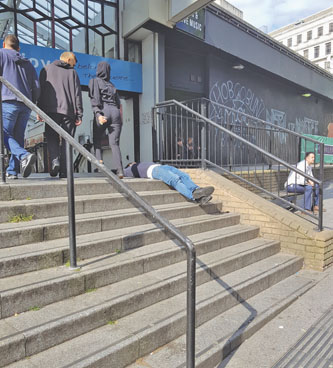The Offender to Rehab initiative has been recognised nationally; it recently won a Howard League for Penal Reform award.
It is estimated that someone addicted to both heroin and crack spends around £19,000 a year on drugs. Much of this may be funded by shoplifting. As stolen goods sell for between a third and half of their shop retail value, a heroin addict would have to steal up to £57,000 of goods, to fund a drug addiction. Hence West Midlands Police officer Stuart Toogood’s idea, to offer, at first in Birmingham, to addicts who are known to high streets as prolific shop thieves, rehabilitation. It was featured in the December print edition of Professional Security Magazine, after Stuart was among the speakers at the 25th anniversary conference of Retailers Against Crime, in Glasgow.
West Midlands Police and Crime Commissioner (PCC) Simon Foster said that the scheme is cutting crime and saving hundreds of thousands of pounds every year.
“Whilst we have focussed on Birmingham so far, I would like to see it rolled out across the entire region and potentially across the country.”
A 2014 report from Public Health England estimated that every pound spent on drug treatment saves £2.50 in costs to society.
West Midlands Police Chief Supt Matt Shaer said: “The impact of the Offender To Rehab programme is deeply impressive.
“Having had the privilege to meet providers and attendees first hand, it really has brought home the difference this innovative approach makes. I believe other localities would similarly benefit.”
More on drugs on the West Midlands PCC website.
Picture by Mark Rowe from 2019; weekday, Birmingham city centre, a zonked out man lying on the street.
Background
The Boris Johnson regime published a UK Government ten-year drug strategy, in December 2021. Meanwhile Dame Carol Black’s independent review of drugs pointed to the need to boost the capacity of the treatment and recovery system. The authorities note that illegal drugs drive half of all homicides, and nearly half of all burglaries, robberies and other acquisitive crimes are linked to heroin and crack addiction; many people entering the criminal justice system have a drugs problem, and around 65pc of those in treatment in prison fall out of it when they leave. The Department of Health and Social Care has announced funding through to 2025 for drug and alcohol addiction treatment and recovery.
Health and Social Care Secretary Steve Barclay said: “Drug misuse has a massive cost to society – more than 3,000 people died as a result of drug misuse in 2021. This investment in treatment and recovery services is crucial to provide people with high-quality support, with services such as expanding access to life-saving overdose medicines and outreach to young people at risk of drug misuse already helping to reduce harm and improve recovery.
“This funding will help us build a much improved treatment and recovery service, which will continue to save lives, improve the health and wellbeing of people across the country, and reduce pressure on the NHS by diverting people from addiction into recovery.”
Earlier this month the Association of Police and Crime Commissioners’ (APCC) Joint Addiction and Substance Misuse Leads Joy Allen (Durham PCC) and David Sidwick (Dorset) met with Government ministers.










